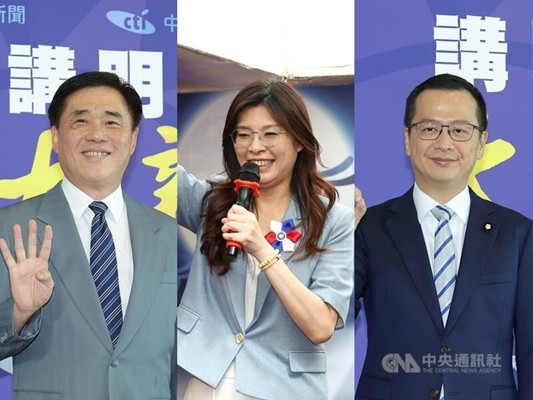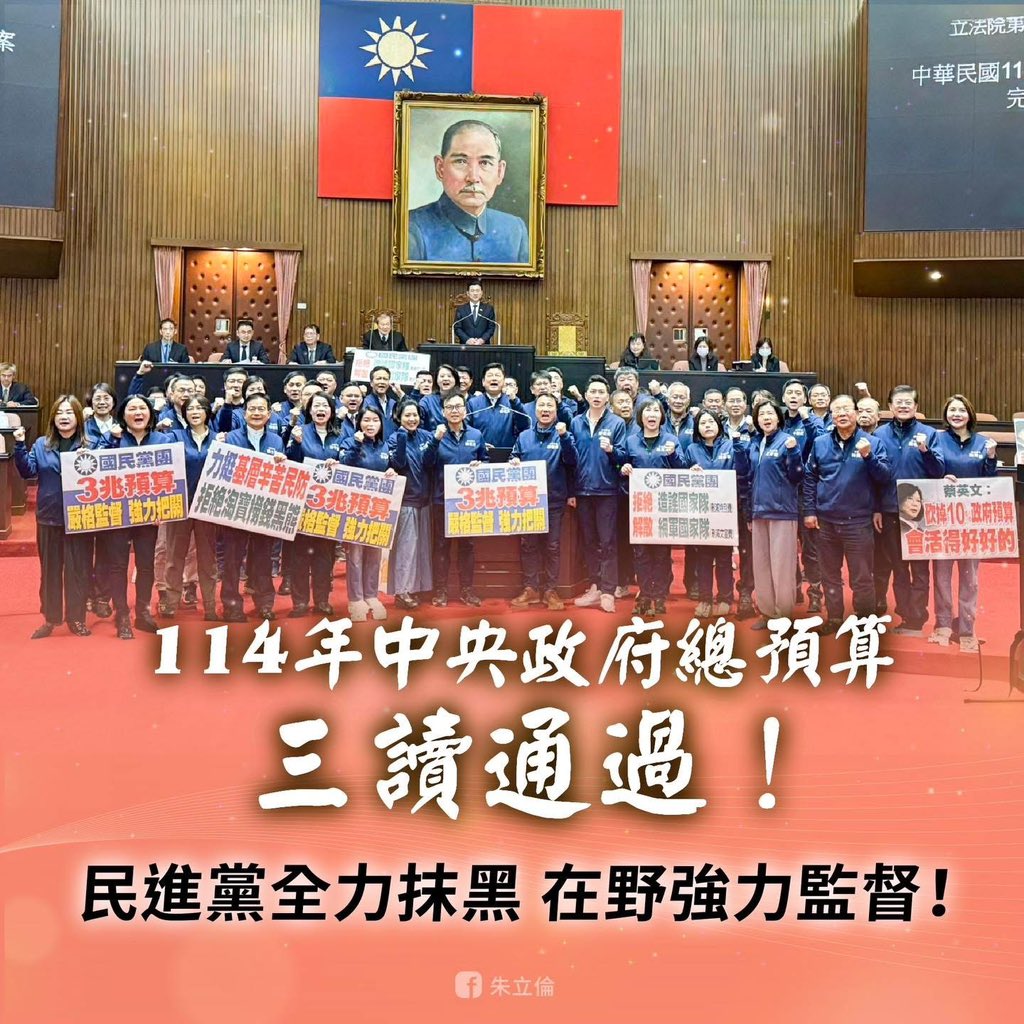
KMT Bottom Lines Following The 2024 Election
KMT Bottom Lines Following The 2024 Election
Executive Summary:
- The KMT emphasizes a balanced approach to preserving Taiwan’s democracy and Indo-Pacific peace, highlighting the importance of not solely focusing on military buildup but also on fostering good neighborly relations.
- Despite not winning the presidency, the KMT achieved significant gains in the Legislative Yuan, positioning itself as a major force for moderation and rational politics, aiming to provide checks and balances and promote economic development, stabilize cross-strait relations, and investigate corruption.
- The KMT plans to deepen its international engagement, particularly with the United States, under its “defense and dialogue” strategy. The aim of this strategy is to enhance national security and manage cross-strait relations, while also committing to internal and strategic reforms to better represent and serve the people of Taiwan.
The Republic of China (Taiwan)’s 2024 presidential and legislative elections concluded without any transfer of power from one political party to another, yet the impact on Taiwan’s political landscape was significant.
The January elections were not, as some claimed, a choice between democracy and autocracy, or between the United States and the People’s Republic of China (PRC). It was rather a choice by the free will of the people of Taiwan. Major political parties in Taiwan, the Kuomintang (KMT) included, all have the best interests of the nation in mind, though their priorities and approaches may vary. The KMT believes the best way to preserve the free and democratic way of life of Taiwan and to safeguard the peace and stability of the Indo-Pacific region is to tackle future challenges in a balanced and multifaceted manner. Emphasis is not solely placed on military buildup, but also on “good neighbor policy (睦邻友好政策)”.
The KMT And A Renewed Legislative Yuan
The KMT’s Hou Yu-ih (侯友宜) admitted defeat four hours after the polling stations closed. It was unfortunate that the opposition parties could not consolidate and rally around a single, unified flag in the lead up to the election. However, Lai Ching-te (赖清德) of the Democratic People’s Party received a 17 percent lower vote share compared to the 57 percent Tsai Ing-wen (蔡英文) received in 2020.
The KMT scored crucial victories in the Legislative Yuan. Despite challenges from the DPP’s established base and the demagogic appeal of the Taiwan People’s Party, the party won 52 out of the 113 seats, an increase of 14 seats from the 2020 elections. With our own version of Angus King and Bernie Sanders, a total of 54 legislators in the KMT caucus will provide the institutional checks and balances Taiwan badly needs, even if this falls just short of an absolute majority. Crucially, the KMT is now the largest party in the Legislative Yuan and represents the electorate’s aspirations for a moderate, rational politics, and its distaste for arbitrary, partisan decisions.
The KMT-led Legislative Yuan is no longer a rubber stamp as it was during the DPP’s unrestrained leadership. The refreshed Legislative Yuan will cease to waive scrutiny of the executive, something that has not taken place for almost eight years. The renewed Legislative Yuan is becoming a branch of the Republic of China (ROC) government that honestly represents the hopes of a great majority of the people in Taiwan to promote economic development, stabilize cross-strait relations, effect real executive efficiency, and investigate corrupt public sector conduct.
The DPP has now lost the total control over all branches of government it held for the last eight years. It is unsurprising that the electorate was unwilling to tolerate one dominant party in Taiwan’s political scene, not least due to a lack of competence and integrity within the ruling party. However, the KMT failed to provide a preferable answer to this public choice question.
The 2D Strategy And The KMT’s International Engagement
The KMT adheres, as always, to the general direction of being “pro-United States, friendly with Japan, and peaceful with the mainland.” It is committed—again, as always—to building lasting, amicable, mutually beneficial relations with like-minded partners around the world to safeguard and expand our international space. As such, it will always be the defender of peace and stability across the Taiwan Strait.
The relationship with the United States is the crux of our foreign relations. The KMT strives to strengthen mutual understanding with American partners and stakeholders in both government and civil society. Through its Representative Office in the United States, it will proactively engage with the US Administration and Congress, Democrats and Republicans, academia, and overseas compatriots’ communities for mutual understanding, confidence, and friendship. The KMT is devoted to maximizing ROC-US mutual benefits through ROC Legislative Yuan-US Congress coordination. As the largest party in the Legislative Yuan, the KMT understands the harsh diplomatic realities our country faces. We will use and expand on existing parliamentary mechanisms to achieve foreign policy goals with our formal allies and friendly partners. Our legislative caucus will work to strengthen legislative coordination on common deterrence against the Chinese Communist Party (CCP) across different countries wherever and however possible.
Going forward, KMT Chairman Eric Li-luan Chu (朱立倫) will continue to implement his 2D strategy (“defense and dialogue”) to enhance the ROC’s national security. Under this strategy, the KMT will strive to assist the ROC’s defense buildup to deter the potential for military adventurism by the People’s Liberation Army (PLA) while working to maintain the necessary communication channels to manage risk, reduce miscalculation, and discourage overreaction to accidental incidents (The Diplomat, December 14, 2023). The strategy is the foundation of Hou Yu-ih’s 3D strategy unveiled for his 2024 presidential campaign (World Journal, March 19, 2023).
The Path Ahead
The KMT is determined to deepen the party’s institutional and strategic reforms to garner support from our people. The KMT will continue to be a party of humility that listens to the people, forms bottom-up consensus from the grassroots level, elevates bread-and-butter issues to the national level, prioritizes youth affairs and policy, and pushes tirelessly for its own rejuvenation (The Diplomat, February 10).
The party failed to achieve an alternation of power in last month’s elections. However, its success in becoming the largest party in the Legislative Yuan and ending the political monopoly of the DPP is a remarkable accomplishment. The success of Taiwan’s vibrant democracy lies in its lively multi-party politics. Without a strong and functioning opposition, Taiwan would run the risk of becoming a one-party state. Over the next four years, the KMT will respect the separation of powers to the fullest to reflect the majority will of the people and to serve the public faithfully. It will make every effort to play the role of loyal opposition and be constructive, responsible, and—most importantly—resolute in upholding of the Constitution of the Republic of China, which assures the maintenance of a peaceful and stable status quo across the Taiwan Strait.


